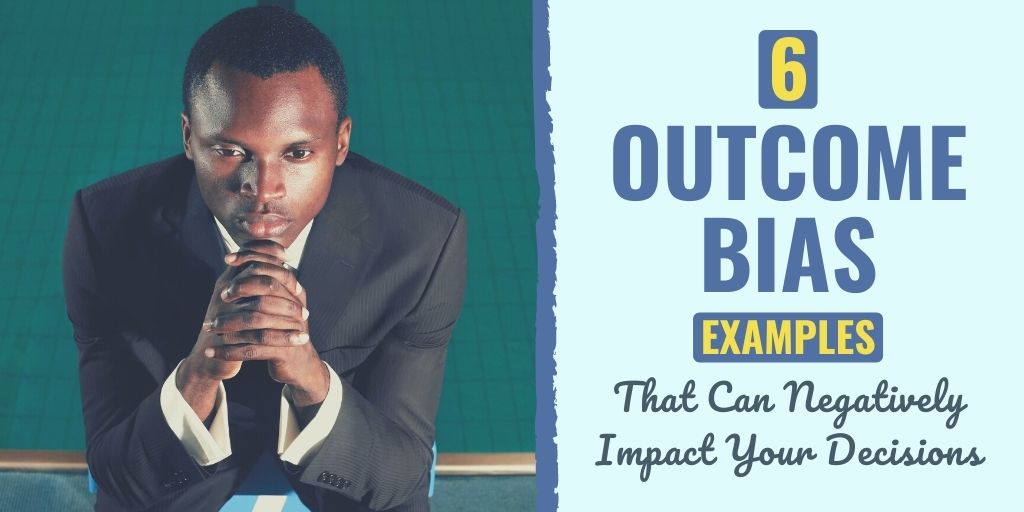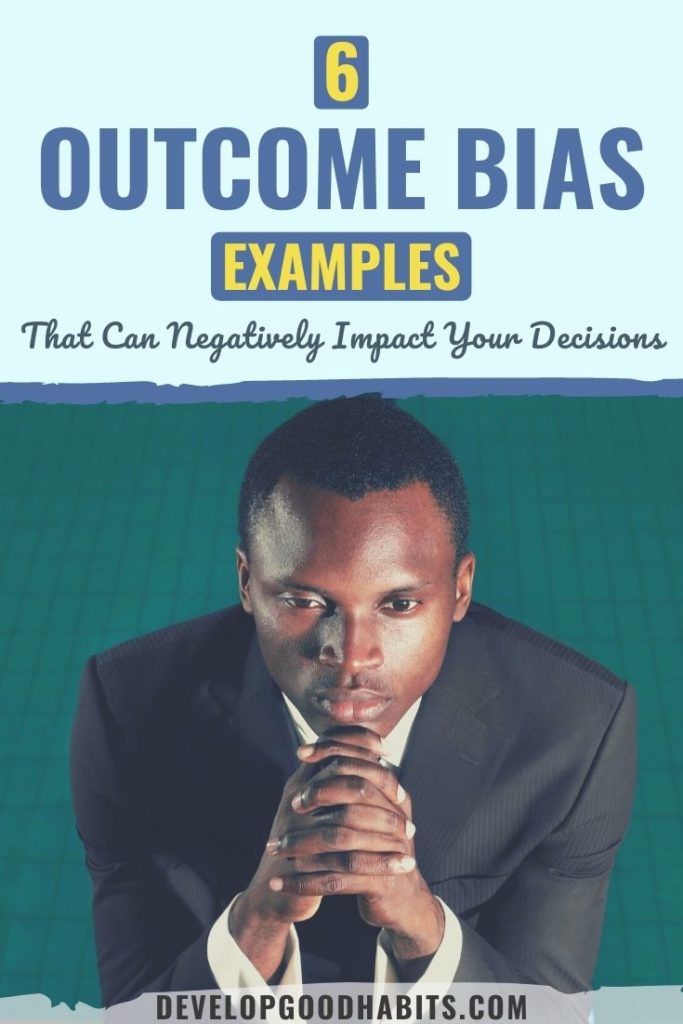Let’s say you’re ready to learn a new hobby–and since your buddies seem to enjoy their poker nights, learning how to play this game will allow you to get in on the fun.
But you’ve got some catching up to do when it comes to knowing how to strategize, so you decide to take some lessons to help prepare you to be a competent player.
You have two options for people that you can hire to be your teacher: one has won seven poker tournaments and earned cash prizes for his winnings, and the other plays recreationally–and while he hasn’t won any tournaments, he makes some extra cash by offering private poker lessons.
They both charge the same for private lessons. Who are you hiring?
If you’re already picking the championship tournament winner, you’ve just fallen for the outcome bias. You’ve made an assumption that the better teacher is the one who has publicly demonstrated his positive outcomes.
But what you haven’t done is take the time to understand how those results were achieved. You haven’t watched either player in action to be able to evaluate their decision-making processes and you’ve relied solely on their outcomes, which can be misleading.
For the tournament winner– what were the qualifications for entering each tournament? Was it an official tournament? When you say “cash prize”–is this a few dollars or a few thousand dollars? What was the skill level of the opponents?
And for the recreational teacher– what have his students gone on to achieve? Perhaps one of his students was the other prospective teacher. Or perhaps he has coached some of the top poker players.
Basing your decision on each teacher’s outcomes fails to take other critical factors into consideration that could determine who is actually the best teacher. You’re placing too much value on results and undervaluing the processes behind those results, which means you’ve fallen for a cognitive bias.
In this article, we are going to learn about the outcome bias. First, we will define this concept, and then we will review 6 examples of this bias that will show you how this faulty method of thinking can negatively impact your decisions.
Let’s get started.
What Is the Outcome Bias?
The outcome bias is a cognitive bias that occurs when the quality of a decision is determined only once the outcome is known. But failing to invest the necessary time in understanding how results were achieved can lead to making low-quality decisions in the future, regardless of former outcomes.
Judging a past decision by its outcome instead of the quality of the decision-making process doesn’t take into account the information (or lack thereof) that the decision maker had at the time they took action. This is faulty reasoning because outcomes of any consequential decision are influenced by external factors and some level of chance, meaning decision-makers never know exactly how a calculated risk will turn out. When your judgments are clouded by outcome bias, you make the mistake of holding decision-makers responsible for elements of a situation that were beyond their control.
The outcome bias is often confused with the hindsight bias, which is similar, but not the same. The hindsight bias encompasses a tendency for retrospective observers to dismiss any possibility that an outcome of a decision could have turned out any other way (i.e. “I saw that coming from the beginning”). The hindsight bias describes a distorted memory favoring the desired outcome, with someone claiming they knew what the outcome would be throughout the entire process, while the outcome bias ignores the process entirely.
We fall victim to the outcome bias because our brains skip over complex processes and jump to the most simplified conclusions possible. We assess people’s competence through our perception of their judgement calls–but this is unreliable if you’re influenced by outcome bias.
Why Is It Important to Recognize the Outcome Bias?
It’s important to recognize the outcome bias so you can establish a good decision-making process. Your ability to improve at anything requires practice plus reflection upon the process that led you to the outcome so you can identify points where improvements can be made.
Once an outcome is known, hindsight interferes with our ability to evaluate whether a decision was good or bad, and while it’s hard to judge yourself–it can be even harder to judge others. Outcome bias can make people–especially leaders–risk averse, but can also allow irresponsible leaders who take reckless gambles to be rewarded if their actions result in positive outcomes.
A mediocre leader may be seen as a visionary with foresight for success if they make a risky decision that results in their favor. In this case, supporters offer a halo to a thoughtless leader, while those who doubted the leader are seen as being timid once the outcome has been made clear.
Finally, the outcome bias can be harmful for decision makers like doctors or politicians who are agents for others, because when the outcomes are bad, people blame the agent for not being able to predict the poor outcome throughout the decision-making process. This is why it’s important to remember that some information isn’t known until the decision-making process is over.
So, how fairly are you judging people’s decisions?
Studies have found that when people evaluate the competence and quality of decisions made by others, 44% of participants considered the decision to be good when the outcome was positive, and only 9% considered the quality of that same decision to be good when the outcome was negative.
Let’s look at some examples to make this concept a bit more clear.
6 Outcome Bias Examples That Can Negatively Impact Your Decisions
1. COVID-19
Decisions that were made by public health officials early on in the pandemic have been judged with the outcome bias. There were essentially four potential outcomes when the coronavirus hit:
- Officials could do nothing and the virus could pass without becoming a big deal (i.e. officials made a good decision)
- Officials could mandate strict rules, and the virus could turn into a pandemic (i.e. officials made a good decision)
- Officials could do nothing and the virus could into a pandemic (i.e. the officials made a wrong decision and will be seen as reckless for not preventing deaths)
- Officials could mandate strict rules, and the virus could turn out to be mild (i.e. the officials are seen as overly cautious and inducing panic in society)
No matter what officials chose to do when the coronavirus initially hit, it would have no influence on the virus because we didn’t know anything about the virus at the time. We can only look back to evaluate those decisions considering the information that officials had at the time of making the decisions– which wasn’t much. It’s easy to judge past decisions about the coronavirus now that we have more information about how things have panned out.
2. Leadership
Consider a superintendent, whose tenure is directly related to student outcomes in their district. Does this mean if a certain district has a highly respected superintendent, you can send your child to school there and they will definitely earn high grades? Considering there are other factors that affect student achievement, such as:
It’s clear that it’s the whole system that either supports or hinders student success, and the role of the superintendent is largely indistinguishable. If applicants for a superintendent job position claim past student achievements as part of their history of success, they’re taking false credit for something that expands much further than their individual role.

According to institutional theory, organizations will stay pretty consistent with their practices, regardless of who the leaders are. New leaders often have little impact on the larger system because groups and individuals are resistant to change and the power of external forces (such as superintendents) is constrained by traditions and norms.
The outcome bias applies to leaders (such as superintendents) because often their process and decision-making ability is ignored and people focus solely on outcomes–whether those outcomes are completely relevant to the leader’s position or not.
3. Investing
Let’s say you have a friend who was talking about how much money they have made with their investment in ABC Corp. You may think, “Great! This must be a stock I should buy!” But, if so, you’re thinking in terms of the outcome bias. Consider some of the factors that may have changed since your friend bought the stock:
When you focus solely on the money that your friend made, you’re ignoring important facts– like the “randomness” component that’s involved with pricing stocks. You have to look at more than a 2-year history of a stock to make an educated decision about your investment. You also need to consider if and when the market is overvalued, and you certainly can’t judge a current investment decision on a previous outcome.
And remember, making a “good” decision today (or one that seems really good) doesn’t guarantee that you will end up with a good outcome. The external factors that are involved play the role of luck in your investments, and you’ll never have all of the information required to make an absolute positive decision when it comes to your investments.
4. Sports
When thinking about sports, you probably assume the decisions that players make are either good or bad depending upon if they win or lose the game. Sports is largely an outcome industry. It’s judged by the outcomes of winning and losing, and many don’t pay attention to how an athlete won a game–they’re only concerned about the winning factor.
People are often unable to recognize the role of luck in sports, and while coaches try to reduce the role that luck plays, it can’t be ignored. A team can do a lot of things wrong, but have a lucky break–and when this happens, people tend to have an inability to chalk things up to chance. Instead, they offer huge praise to players who made mediocre plays.
Let’s say someone made a pass that ended up being successful. Does that mean their decision or strategy behind that pass was good?
Not necessarily, because there are other factors that come into play. The other team’s defense may have not been paying attention, allowing the pass to be successful. This means the decision to make the pass produced a positive outcome because the other team’s defense was bad–not because the tactics behind the play were necessarily good.
Or, the play could have stemmed from a risky or bad decision that ended with luck.
When coaches and teams go back and watch videos of past games, they may fall for the outcome bias by basing the quality of players’ decisions on the outcome rather than analyzing the situation in its entirety. If a player made a goal, was it completely relevant to their decisions leading up to it? Or was there some luck or external factors that had an impact on the goal being successful? The events leading up to the goal may be de-emphasized while the outcome itself is overemphasized.
As far as coaches go, they’re judged on the outcomes of the games they coach–which is a vital part of their continued employment. But there are more factors that go into the quality of a coach, such as their leadership skills, their ability to maintain a motivated team, their knowledge, and the level of support they offer the players.
One suggestion that has been made to reduce the outcome bias in sports is to adopt an objective grading system for things like attempting a goal where players are evaluated based on the quality of their work leading up to their shot, regardless of the outcome, based on things like:
Along with a detailed grading system for attempted goals comes a release of attachment to the outcome. Evaluating the quality of micro possessions in a game and reflecting on players’ approaches to success with same amount of analysis as their approaches to unsuccessful attempts can help coaches determine the factor that luck may have played and help players recognize that they can do everything right–do exactly what they were coached to do–and miss a shot.
Players can’t just accept favorable outcomes and move on without looking at the preceding events. Rather, it’s critical to assess successes with the same amount of scrutiny as failures.
5. In Professional Settings
In business settings, employees’ performance can be overemphasized, which leads to a culture based on outcomes. This type of work environment can lead employees to believe that they’re either good at their job–or not. Without caring too much about the process leading up to the outcome, employees may overlook some lapses in judgement when it comes to ethics and policies if the outcome turns out to be positive.

The outcome bias comes into play when employees are evaluated based on their results instead of the quality of their decision. Considering that most business decisions entail some uncertainty, rather than recognizing the quality of employees’ decisions, they over-reward good luck.
If two employees have identical information to come to a final decision, their performance up until the final outcome should be considered, even if one produced a favorable outcome and the other did not. However, extensive research has shown that performance evaluations are largely influenced by outcome information. This assigns weight to irrelevant information in the understanding of one’s comprehensive knowledge, abilities, and performance.
So while we typically associate having a lot of skills with having good outcomes and having very few skills with bad outcomes, doing this underestimates other factors involved in one’s overall success.
6. Ethical Judgements
Studies have found that people judge more of the same behaviors as being unethical, blameworthy, and punishable if they result in bad outcomes than if they result in good outcomes–even if the outcome is completely determined by chance. In fact, some who perceived behaviors as being acceptable while watching a process, later perceived those same decisions as being unethical once they learned of the unfavorable outcome.
Consider these two scenarios:
- A pharmaceutical researcher has strict criteria for study participants to be data points in his research to get a product on the market. He believes the product is safe and is quickly nearing his deadline. When analyzing his research, he discovers he needs just three more data points to make his results statistically significant. He makes up some data and adds it to his research, allowing the drug to hit the market.
- Same situation, but instead of making up three imaginary data points, the researcher notices that three data points had been withdrawn from the final data set because of irrelevant technicalities. He believes that this missing data is appropriate to use–and sure enough, when he adds these participants’ data back in, the results just barely become statistically significant. The drug soon hits the market.
Consider which situation you believe is more ethical than the other.
In this study, the participants assigned higher ethicality ratings to scenario (B), meaning the researcher who used actual data acted more ethically than the researcher who made data up.
Now, let’s bring in the results:
- In scenario A where the researcher made up imaginary people, the drug ends up being both effective and profitable, and longitudinal research years down the road shows no significant side effects.
- In scenario B where the researcher added in some true data points, the drug is later recalled from the market after killing five people and making hundreds sick.
In this study, the participants who knew the outcome of each scenario assigned higher ethicality ratings to the positive-outcome scenario (A), where the data was made up. This shows that the ethical judgements of the researchers’ behavior before the product hit the market was affected by information that was unknown by both researchers at the time of their actions.
Do you excuse personal actions that are ethically questionable if they don’t result in negative outcomes? What about other people’s actions?
How to Overcome the Outcome Bias
This first step to overcoming the outcome bias is to shift your focus from the outcome of a process to the process itself. Regardless of the outcome of a decision, reflect on the process and identify flaws, reflecting on:
- People- Who was involved in the decision? Were all of these people relevant?
- Information- Are you focusing on information that was available at the time the decision was made? Are you putting too much emphasis on irrelevant information?
- Ownership- Did the right people make the decision?
- External influences– Were there other factors that skewed the decision?
Secondly, remember that focusing solely on an outcome can cloud your judgement because complexity and luck will always play a part in results. This means you can’t assume you did a great job when you got something right–you have to evaluate the process to find where you have room to improve. Doing this will help reduce blame culture and cut down on over-rewarding people who merely had good luck.
By evaluating your processes, you can make better decisions in the future without allowing the outcome bias to cloud your judgement. Always consider all possible outcomes that can come from your actions. Finally, determine what outcomes are the result of poor choices versus what is the result of a lack of resources to make better decisions in the future.
Final Thoughts On the Outcome Bias
It’s important to be able to recognize the external elements that influence your outcomes so you can identify any flaws in your decision-making process.
You can’t judge a decision by its result, especially if external factors play a role. A bad outcome doesn’t always indicate a bad decision–and vice versa. So instead of stressing over a wrong decision, consider why you made your decision. If your methods were rational, then it would benefit you to use that method in the future, even if you didn’t succeed the first time.
Learn More About Logical Fallacies
- 15 Cognitive Biases: A List of Common Biases Many People Have
- Mere Exposure Effect: Definition & 5 Examples
- 5 Appeal to Nature Fallacy Examples in Media and Life
- 7 Self-Serving Bias Examples You See Throughout Life
- 7 Omission Bias Examples That Negatively Impact Your Life
- 6 Authority Bias Examples That Might Impact Your Decisions
- 5 Burden of Proof Fallacy Examples
- 5 Appeal to Tradition Fallacy Examples in Life
- 5 Appeal to Authority Logical Fallacy Examples
- 7 False Cause Fallacy Examples
- 7 Appeal to Ignorance Fallacy Examples
- 7 Appeal to Common Sense Logical Fallacy Examples
- 5 Post Hoc Fallacy Examples (and How to Respond to This Argument)
- Gambler’s Fallacy: 5 Examples and How to Avoid It
- 5 Appeal to Anger Fallacy Examples Throughout Life
- 7 Halo Effect Bias Examples in Your Daily Life
- 7 Poisoning the Well Examples Throughout Your Life
- 7 Survivorship Bias Examples You See in the Real World
- 7 Dunning Kruger Effect Examples in Your Life
- 7 Either Or (“False Dilemma”) Fallacy Examples in Real Life
- 5 Cui Bono Fallacy Examples to Find Out “Who Will Benefit”
- 6 Anchoring Bias Examples That Impact Your Decisions
- 7 Virtue Signaling Examples in Everyday Life
- 7 Cherry Picking Fallacy Examples for When People Ignore Evidence
- 9 Circular Reasoning Examples (or “Begging the Question”) in Everyday Life
- 9 Appeal to Emotion Logical Fallacy Examples
- 9 Appeal to Pity Fallacy (“Ad Misericordiam”) Examples in Everyday Life
- 9 Loaded Question Fallacy Examples in Life and Media
- 9 Confirmation Bias Fallacy Examples In Everyday Life
- 9 Bandwagon Fallacy Examples to Prevent Poor Decisions
- 5 Red Herring Fallacy Examples to Fight Irrelevant Information
- 9 Middle Ground Fallacy Examples to Spot During an Argument
- 5 False Equivalence Examples to Know Before Your Next Argument
- 7 Hasty Generalization Fallacy Examples & How to Respond to Them
- 6 Straw Man Fallacy Examples & How You Can Respond
- 6 False Dichotomy Examples & How to Counter Them
- 7 Slippery Slope Fallacy Examples (And How to Counter Them)
- What is the Planning Fallacy?
- How to Overcome the “Sunk Cost Fallacy” Mindset
Finally, if you want a simple process to counter the logical fallacies and cognitive biases you encounter in life, then follow this 7-step process to develop the critical thinking skills habit.

Connie Mathers is a professional editor and freelance writer. She holds a Bachelor's Degree in Marketing and a Master’s Degree in Social Work. When she is not writing, Connie is either spending time with her daughter and two dogs, running, or working at her full-time job as a social worker in Richmond, VA.


